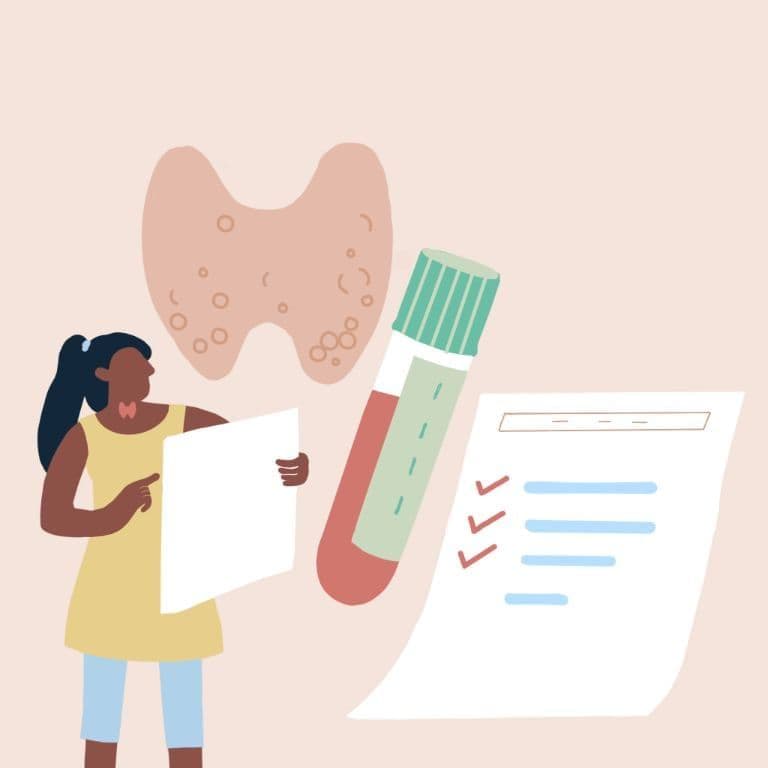This article has been compiled by Vaibhavi Kodnani, a content writer at Proactive For Her.
What is the thyroid gland?
The thyroid is a butterfly-shaped gland, located in the front of the neck. It is the largest endocrine gland in humans that synthesizes two main hormones Triiodothyronine (T3) and Thyroxine (T4) and releases them directly into the bloodstream. These hormones are responsible for many vital body functions in the body:
- Long term regulation of the metabolic rate
- Growth and development of the body
What is hypothyroidism?
When you have hypothyroidism or an underactive thyroid, your thyroid gland does not make enough thyroid hormones required for your body. This condition will affect your metabolism and change the way your body uses energy - it will not be utilised optimally. It will affect almost the functioning of almost every organ including your heart and brain.
There are various symptoms associated with hypothyroidism that can vary from person to person. As hypothyroidism develops slowly, you may not notice these symptoms for months or even years. Some common ones include:
- Fatigue
- Weight gain
- Trouble tolerating cold
- Joint and muscle pain
- Dry skin
- Dry, thinning hair
- Heavy or irregular menstrual periods
- Fertility issues
- Slowed heart rate
- Depression
What is the effect of hypothyroidism on your skin?
Our skin is rapidly ever changing by a process called skin cell turnover wherein there is production of new skin cells to replace the existing skin cells. In hypothyroidism, your skin cells do not receive growth signals from the thyroid hormone. When the normal cycle of skin renewal breaks, it may take longer for the skin to grow. It means that the outer layer of the skin remains for a longer time. The dead skin keeps accumulating and takes longer to shed. All of these result in various skin changes, the most common being dry, flaky skin.
Myxedema
Myxedema refers to skin changes that occur in severely advanced hypothyroidism. You can experience the following typical skin changes:
- Face swelling including your lips, eyelids, and tongue
- Swelling and thickening of the skin of your body, especially in your lower legs
Pale, thin, and wrinkled skin
This disease can have drastic effects on your skin such as making it thin and wrinkled.
Extremely dry skin
Hypothyroidism also leads to extremely dry and flaky skin. In severe cases, the process of sweating may be affected. The palms of your hand and soles of your feet can become thick and dry. The skin surface can crack and become extremely itchy.
Carotenemia
In this, you will notice a yellowish pigmentation on the palms and soles.
Xerosis
More than half of the people having hypothyroidism experience poor skin hydration and changes in the skin texture. Your skin becomes rough, dry with a scaly texture.
So how can you find out if you have thyroid issues?
The only way to detect if a person has any thyroid issue is through a couple of blood tests.
TSH test
Doctors usually do a TSH test to check the amount of TSH in the blood. TSH is a hormone made in the pituitary gland that tells the thyroid how much T4 and T3 to make.
A high TSH level means that the thyroid isn’t making enough hormones. As a result, the pituitary keeps making and releasing TSH into blood. This condition is hypothyroidism, or an underactive thyroid.
A low TSH level means the thyroid is making too much hormone, so the pituitary stops making and releasing TSH into blood. This condition is hyperthyroidism, or an overactive thyroid.
If the TSH test results are not normal, you will need at least one other test to help find the cause of the problem.
T4 tests
A high blood level of T4 may mean hyperthyroidism while a low level of T4 may mean hypothyroidism.
Sometimes, high or low T4 levels may be due to some other conditions. Your thyroid hormone levels will be higher if you are pregnant or taking oral contraceptives. Severe illness or using corticosteroids to treat asthma, arthritis, skin conditions, and other health problems can lower T4 levels. These conditions and medicines change the amount of proteins in your blood that ‘bind’, or attach, to T4. Bound T4 is kept in reserve in the blood until it’s needed.
FT4 Test
This test measures free T4 in the blood. Free T4 is not bound to the proteins and enters the body tissues where it's needed.
T3 test
A T3 test is mostly used to diagnose hyperthyroidism. However, doctors prefer measuring both T3 and T4 levels for confirming hyperthyroidism.
FT3 Test
FT3 can assist in determining whether the thyroid is performing properly, and is used mainly to help diagnose hyperthyroidism. This test may also be used for monitoring of patients on T3 therapy.
Thyroid antibody tests
There are different types of thyroid antibodies. Some antibodies destroy thyroid tissue. Others cause the thyroid to make too much of certain thyroid hormones. Thyroid antibodies test usually measures one or more of the following types of antibodies
Thyroid peroxidase antibodies (TPO)
This test measures the level of thyroid antibodies in your blood. These antibodies can be a sign of two autoimmune diseases that are a common cause of hypothyroidism.
- Hashimoto disease or Hashimoto thyroiditis
- Graves' disease
Thyroglobulin antibodies (Tg)
This test measures the amount of thyroglobulin in the blood. Thyroglobulin (Tg) is a protein produced by your thyroid gland. The thyroglobulin antibodies can also be a sign of Hashimoto disease.
Thyroid-stimulating hormone (TSH) receptor
These antibodies can be a sign of Grave's disease.
How to treat thyroid related skin issues?
If you get diagnosed with thyroid disease, and are facing skin issues, it is better to consult a dermatologist and get medical advice for the same. With certain tips, you will be able to manage your skin issues much better.
Conclusion
Since hypothyroidism develops slowly, it may be difficult to get early diagnosis. It is advisable to get tested for it frequently if you have had people with thyroid issues in your family before. Your skin may undergo many changes - it may feel dry, flaky and itchy but it is possible to manage it with the right care. Always take your doctor’s advice to follow an appropriate treatment plan.
Disclaimer - This information is provided for educational purposes and should not be construed as medical advice. Please consult with your healthcare practitioners before undertaking any changes in your diet or adding supplements.
Proactive For Her is a digital clinic for women, offering accessible, personalized, and confidential healthcare solutions. We offer products and services for out-patient health concerns of Indian women, across their lifetime - from puberty to pregnancy to menopause. To know more on the sexual and reproductive health of women, visit https://www.proactiveforher.com/

